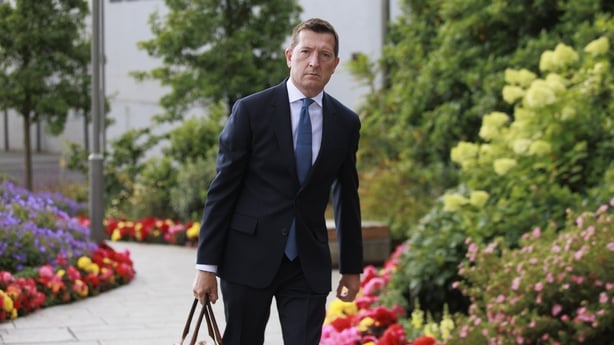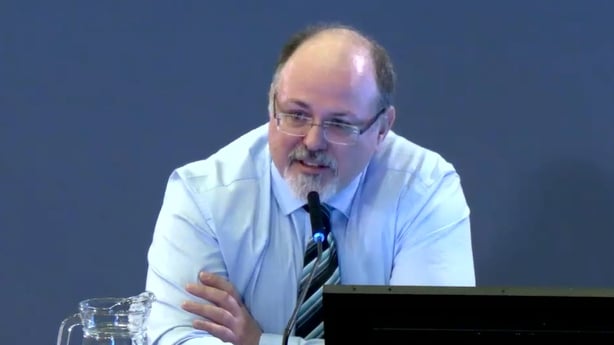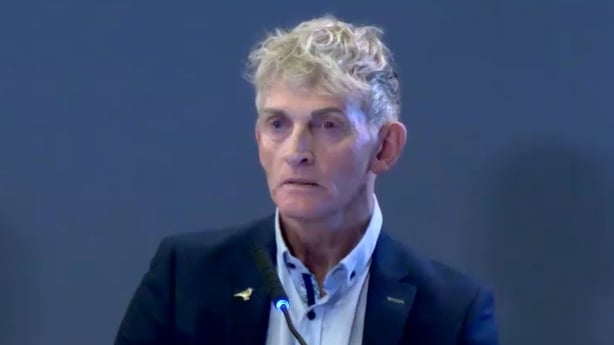The Omagh inquiry team has said it expects to sign a memorandum of understanding with the Irish Government in March over the disclosure of sensitive material it may hold about the 1998 atrocity.
Paul Greaney KC, counsel to the inquiry, said "outstanding issues" between the inquiry team and the Irish Government on a framework for disclosure had "narrowed".
"We will not pre-empt the detail of that memorandum of understanding while a substantive response is awaited and further information will be provided to all the core participants as soon as possible." he said.
"Our current understanding is that the Irish officials intend for the memorandum to be signed in March, subject to approval of their Government."
The Department of the Taoiseach confirmed that discussions between the Government and the Omagh inquiry team are ongoing and are "progressing well".
In a statement, it said it expects to conclude discussions on a memorandum of understanding for the sharing of Irish State materials "in the weeks ahead".
"This is an important step in delivering on the commitment in the Programme for Government, to 'play our full part in legacy processes…including facilitating and supporting the Omagh Inquiry,'" the statement added.
There have been calls for the Irish Government to release documents and provide witnesses to the bombing inquiry.
The device was made in the Republic of Ireland, the bombers came from there and returned after the device had been planted in Omagh.
Mr Greaney said the inquiry had provided written observations on a draft memorandum of understanding to the Irish Government last week.
Read more: Omagh inquiry: The victims remembered
The Inquiry chairman said that anyone who has watched the last four weeks of evidence cannot be left in any doubt as the horrific consequences of terrorism.
Alan Turnbull was speaking as he brought the last of the commemorative hearings to a close.
He said he hoped the bombers had heard something of the evidence so that they might understand the "indiscriminate and devastating consequences" of what they had done for "innocent, hardworking and caring" people.
He commended all those who'd given testimony in recent weeks for their "bravery, strength and generosity".
Mr Turnbull said he had been struck by the "utterly enduring" grief of the bereaved; the "appalling nature of the injuries" for those still living with their disabilities; the extent of the damage done to people's mental health; and the way in which the emergency services and ordinary civilians had performed "heroic acts" on 15 August 1998.
Paul Greaney KC, counsel to the inquiry, said the central question under the inquiry's terms of reference was whether the UK authorities could have prevented the bombing.

"No-one who has heard what you have heard and what we have all heard, could fail to understand why the answer to that question is crucial."
Mr Greaney said the purpose of the four weeks of commemorative hearings had been to give proper prominence to those who had suffered grievously.
Much of what had been heard had been "beyond distressing", he said, and tears had been shed both inside and outside the inquiry room.
"People have revisited memories that had been shut away or suppressed but these hearings have been important because we believe that they have placed those who died, their families and so many others affected by the bombing at the heart of your inquiry."
Day of Omagh bomb 'forever etched in us', says survivor
A survivor of the Omagh bomb has told the inquiry into the 1998 atrocity that it is a "fine line" between sadness and happiness about still being alive.
In a witness statement read into the record this morning, Mary McGovern described how her body had been "peppered" by shrapnel in the explosion.
She said for 20 years, small pieces of metal continued to work their way out of her body.
She suffered a serious injury when a twisted piece of metal the "size of a fist" tore into the top of her leg.
Ms McGovern, who now lives in Australia, said for years she had to deal with survivors' guilt.
"Why did I survive, why did I escape. How did I leave my friends and workmates.
"This guilt played on me often, for a long time, years, but now I can manage it, mostly."
She described how she knew several of the dead well as they were regular customers in the bakery where she worked.
She was standing close to the car bomb when it exploded. She described it as a "ferocious gust of wind".
"All those who survived - with and without injury - that day is forever etched in us."
She said her scarred leg was a constant reminder of her trauma and she had had to explain her injuries to her two daughters.
"It's hard to tell your children how and why you're scarred. They think it's incredulous to believe that their mummy was in a bomb, very far away from the life we live in Australia."
Ms McGovern said after the bombing people were kind, but she was conscious that many others had been physically injured in much worse ways.
"I felt pity from people, but also they knew that I was lucky to be alive.
"It's a fine line between sadness and happiness to be alive."
Watch: Inquiry into Omagh bombing under way
She said there had been a procession of VIP visitors to the hospital where she was treated including the then Prince Charles, former Northern Secretary Mo Mowlam and then RUC chief constable Ronnie Flanagan.
They told her the bombers would be caught, but that did not happen, something she said angered her.
"I want to acknowledge that I am so lucky to have loved and had a family while that liberty was taken away from so many."
The inquiry also heard from Anne Cullen, a taxi driver in Omagh that day.
She was a trained first aider who went to the scene to help. She described seeing a woman lying dead amongst the rubble. She said she looked peaceful "like a princess".
Helen Kerr had been in town with her 15-year-old daughter to buy a new school uniform.
She said they had been in a cafe close to the bomb when it went off.
She said the noise of the explosion was awful, but the sound of the screaming was worse.
She said her daughter had suffered panic attacks for years later.
"Although it seems so long ago, to me it's as if it happened recently," she said.
This is final day of commemorative hearings and the last evidence session of four weeks of often emotional evidence.
The inquiry is being held to determine whether the 1998 dissident republican bombing could have been prevented and if there were intelligence failings at the time.
But the first few weeks have been about putting the victims of the atrocity at the heart of the inquiry.
Families of the 29 people killed delivered pen portraits of their loved ones and spoke of the impact of their murders.
One of those murdered was a woman pregnant with twins.
There was graphic testimony yesterday from police officers who responded in the immediate aftermath of the bombing.
The spoke of a hellish scene in Market Street as they tried to deal with the scale of the atrocity and recover the bodies.
Inquiry chairman Alan Turnbull will make some closing remarks before the inquiry rises for several months ahead of the next phase of its work.
He is expected to address the question of what progress has been made on how the Irish Government can co-operate fully with his inquiry.
The Government has said it will not be found wanting.
The 22kg bomb was built in the Republic of Ireland, the bombers came from there and returned after planting it.
The families of those killed have said they want to see sensitive intelligence material that may be held south of the border and hear from witnesses in the Irish security and intelligence agencies.
The inquiry is expected to reconvene in the early summer with each of the core participants setting out their positions in detailed opening statements.

Dental surgeon recalls trying to help injured after blast
A man who now works as a general dental surgeon in Donegal gave evidence of how he had tried to help the injured that day.
Simon McLarnon was living in Omagh at the time.
He said he had the benefit of some general medical training which he tried to deploy on the day, though he still felt he "hadn't done enough".
Mr McLarnon ran to the scene from his home a short distance away and described thick dark acrid smoke filling the air.
He said one victim stood out in his memory.
"He was a young boy that was killed and as I went to check his pulse, I realised there was nothing there.
"That's the first time I'd ever done that in my life. That was hard to deal with. I remember the look on his face," he said.
Mr McLarnon added that a neighbour with a camcorder had accompanied him down the street. He later met another man with a camera who was taking video of the immediate aftermath of the bombing.
He told him to move closer so that the pictures could "show the world what these b******s have done to us".
Later Mc McLarnon's neighbour talked about destroying the footage he had taken.
"He says, 'You know you couldn't show what's on this camera’ and we told him, 'No, no, this could be very important, both to show people what happened and also for the evidence for the police'.
"So that's the footage that you see now of the Omagh atrocity."

'There were people just lying different angles everywhere' - survivor
Later Rodney Patterson described being caught in the blast.
He added that the pressure wave from the explosion had enveloped him after an "unmerciful bang".
"I remember my eyes swelling up, so I put my hands against my eyes, and I thought my eyes were coming out.
"The pressure was awful. I couldn't breathe. It seemed to suck all the oxygen out of my body and everything went jet black."
He said he was dragged backwards, the woman he was with was sucked through a shop window. He put his hand to his head and found a large shard of glass sticking out of his forehead.
"There were people just lying different angles everywhere. I didn't know what it was, I couldn't take it in."
He looked down and saw a woman lying at his feet. He believed she was dead.
Mr Patterson said he never recovered psychologically.
The bombing had changed everything for him and had never spoken of that day since until he prepared his statement for the inquiry.
"It changed my life forever. I found it difficult to mix with people. Crowds of people put me off. I can't stay to the end and I have to be near doors. I have to get out quickly if needs be."
The inquiry also heard of the huge pressure placed on the local hospital.
A total of 209 casualties were treated there, a further 71 went to the Erne Hospital in Enniskillen. Fifty-six others went to Altnagelvin in Derry.
At one point two busloads of bleeding casualties turned up at Omagh's hospital. It was also receiving those brought in by taxi, car and ambulance and scores of walking wounded.
Five hospitals in total activated their emergency plans.
Many medical staff and their relatives were among the deceased and injured.







